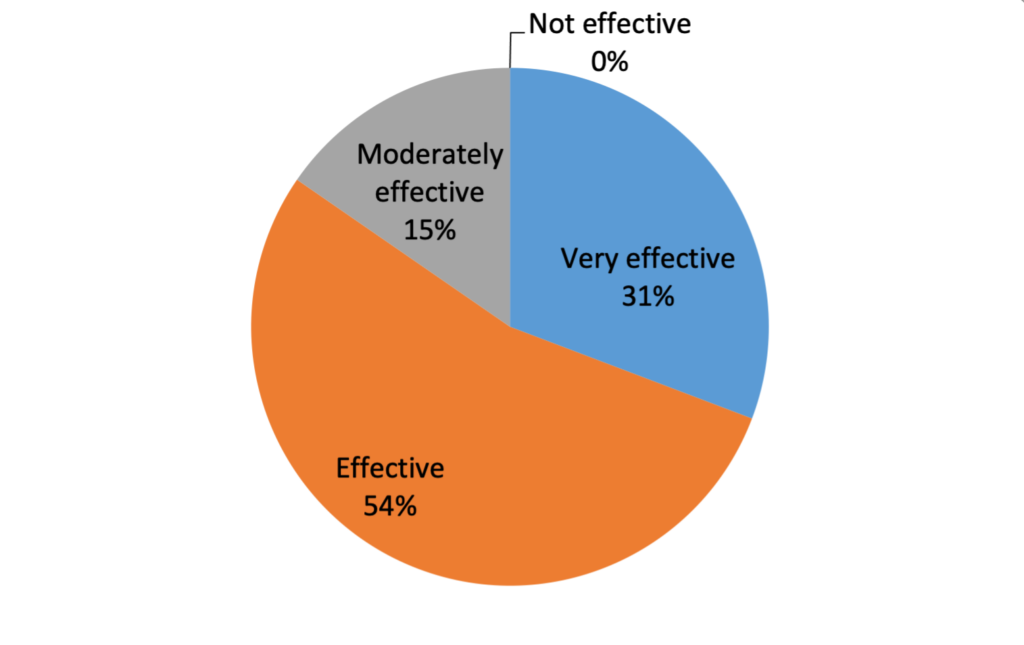Facing the challenge of opening new potential for small and medium-sized enterprises (SMEs) in an increasingly interconnected and digitalised business landscape, 8 partners with expertise in blockchain technology, digitalisation, logistics, business development, and technology transfer have joined forces to build the Blockstart ecosystem. In a collaborative effort, the partners have set up a multi-faceted training programme targeting SMEs in the agrofood, healthcare, and logistics sectors to optimise their processes and make them more efficient with the help of blockchain technology. In the meantime, 14 experts have been recruited for the programme. They impart practical knowledge in courses not only about blockchain technology, but also about the development of new business fields as well as regulatory issues relating to medical technology products.
Since 2019, more than 30 small and medium-sized companies from North-West Europe have benefited from the comprehensive Blockstart SME training programme. After successfully completing the first courses, the companies evaluated the courses in different categories and what impact they had on the development of new products or services:
- Quality of course content and experts
- Effectiveness of trainings and workshops
- New product developments
- Cooperation opportunities
- Creation of new jobs
- Implementation of blockchain technology
Overall, 12 companies participated in the evaluation of the SME Training Programme. The participating companies rated the courses overwhelmingly positively, with nearly 85% being satisfied to very satisfied.
Blockchain technology courses cover different skill levels, from basic to advanced knowledge. Attendees are introduced to various popular applications and are provided with an impact evaluation for their own products or services to assess whether blockchain is beneficial to the business or whether another solution would be equally suitable. In this way, cost-benefit analyses were conducted for the companies to help make decisions about the use of Blockchain technology in the company. For example, the SME HeartGo was spurred to innovate their products by Michael Munz's Deep Dive - Blockchain in the Healthcare Industry course.
“Blockchain and DLT are completely new to us. We learned about the basics and typical use cases as well as use cases which might make sense for HeartGo. The trainers structured and delivered the topics nicely.”
HeartGo
Likewise, initial use cases for the SMEs' products were discussed or early approaches to implementing a Blockchain were developed. Overall, there was a great deal of interest in using the knowledge gained to take a more in-depth look at the subject and to take advantage of the second stage of the programme. In this later stage, the SMEs can develop a proof-of-concept together with the experts.
In addition to the blockchain-specific courses, the companies also evaluated courses on the regulation of medical technology products. Particularly positive feedback was expressed for our external expert Christoph Kieselbach from Schrack & Partner, who is an important contact for medical technology companies in the BioRegion STERN when it comes to questions about MDR:
“If there was an option of “excellent”, I would tick that instead! Christoph was brilliant at not only delivering the content but helping in navigating the medical device landscape for products that are “un-traditional” and require some additional critical thought.”
Bronic Co. LTD
The courses offered were effective for 85% of the SMEs and guided them in the implementation of blockchain technology. Almost all companies had developed new innovative products or services that, in combination with blockchain technology, are expected to open new business areas.
“We are currently putting together the technical specification of our product, so it has helped a lot to define the attributes relevant to blockchain and the overall role of blockchain in the product architecture.”
Lemsford Mill Controls Ltd
The Blockstart project has a clear ambition to promote the formation of new collaborations bringing innovative blockchain-based products to the European market. Hence, the courses offered SMEs the opportunity to find new cooperation partners for the development of their products, and help them to implement the blockchain technology.
“We are still ongoing in the Blockstart programme and might yet meet partners for collaboration.”
Royal Eijkelkamp
Through the Blockstart project, new jobs are expected to be created in Europe. By using blockchain technology, SMEs state they will be able to create an average of 3 - 10 jobs over the next three years.
The Blockstart project offers SMEs further support for the introduction of their own blockchain in order to achieve the desired objectives. In doing so, SMEs now have the opportunity to explore how a blockchain can make the company's business model more efficient in a proof-of-concept approach together with Blockstart partners Multitel and ChainPoint.



